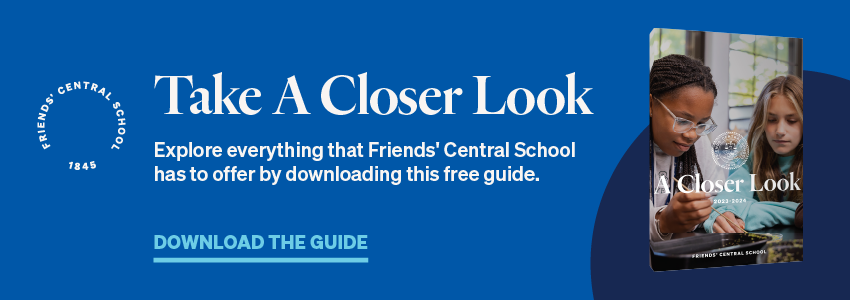
If you are a parent, then you understand just how important it is to make sure you are choosing the right education for your child. Whether that means attending a public, private, or independent school will of course vary from student to student and family to family, because no one option will work for everyone.
That said, attending an independent school might be just what your child needs in order to bloom into an intelligent, confident leader in today’s world. Below, we discuss what we believe are the 10 most important reasons that you should consider an independent school education for your child.
Free Downloadable Guide: Take a Closer Look at Friends' Central School
1. High academic standards
While public schools have their academic standards set by state and federal regulations, independent schools have the freedom to set their own standards when it comes to assessing student learning and development. These standards are very often higher than what would be expected from students in a public school setting. By holding all students to a higher academic standard, independent schools create a culture of academic excellence, encouraging all students to excel. 2. Excellent teachers, who are free from testing standards
This point is related to the first point discussed above. A major source of stress for both students and teachers at public schools is the importance that is placed on standardized testing. It is used to not only evaluate a student’s proficiency in various topics, but to evaluate an educator’s proficiency in teaching those topics to students.
Because of the importance placed on performing well on these standardized tests, public schools devote a lot of classroom time and resources to specifically teaching students how to take these exams. This strategy of “teaching to the test,” though, breeds students who are skilled at memorization but lack the ability to think creatively and problem solve.
Independent schools are not required to evaluate their students with standardized testing (though many still do participate). This allows for more freedom in the classroom, which attracts passionate and talented teachers who want to work somewhere that gives them more autonomy and less bureaucracy. This allows independent school environments to instill a love of learning, rather than simple test-taking competency.

3. Personal attention
Independent and private school classrooms typically have a much lower student-to-teacher ratio than public schools. This allows for more opportunities for student participation, more personal, one-on-one education and guidance, bolstering student performance and offering a strong support network for the inevitable challenges that accompany adolescence. 4. Innovative and exciting curriculum
Because independent schools are not as burdened by bureaucracy and regulations as public schools are, they have more freedom to be nimble and experimental in their educational approaches. This is especially important in today’s fast-paced, rapidly changing world, where new technologies and methodologies are popping up all the time. By being nimble, independent schools are able to better serve their students, offering courses that develop critical thinking, substantial writing requirements, and hands-on discovery. 5. A community drawn to a mission
While public schools are limited in what and how they can teach their students, independent schools are much freer to pursue educational practices that align with their core missions, philosophies, and values, which very often aim to not only educate their pupils, but transform them into creative, civically minded leaders. By attending an independent school, your child can gain access to a passionate, mission-oriented community of teachers, parents, and other students.

6. Deep and lasting friendships
At its core, attending an independent school is very different from attending a public school, especially in terms of the friendships that are made. The idea of “community” is so important to most independent school cultures that it spurs deep connections. This, plus the depth of an independent school experience, means that students get to know one another very well. Sharing the unique experience of attending an independent school together means that friends often stay friends for years after graduation.7. Access to teachers and administrators
Independent schools typically offer a partnership between parents, teachers, and school administrators so that everyone is working together to challenge and support your child. Parents and teachers are on the same team. This encourages mutual support between parents and teachers, ensuring that students are challenged academically, assignments are complete, students are fully engaged, that important values are reinforced at school, and that a child’s happiness and emotional well-being are valued.
Because teamwork is the name of the game, independent school teachers will typically make themselves as available as possible to parents for conversation, whether that is a phone call in off hours, quick turnaround on an email, or a face-to-face meeting.

8. Focus on the whole child
There is no doubt that academics are important—whether your child attends a public or independent school, a strong academic foundation is essential to a promising and successful future. And yet, there is more to your child than academics.
Independent school teachers understand that educating your whole child is an important and essential part of their job as teachers. This is accomplished through the classroom, yes, but also outside the classroom—in the form of sports, clubs, and extracurricular activities that allow your child to explore and develop the many facets of their personalities and interests that make them unique.
9. Invested parents
Something that is often overlooked by parents who are considering enrolling their child in an independent school is: What will the other parents in my school network be like? When you enroll your child in an independent school, you join a set of parents who are deeply invested in their children's experience and the outcome of this investment.

10. Curriculum that is broad and deep
Excellence in core subject areas like math, English, science, and history are essential, but these subjects should not make up the entirety of your child’s education. Independent schools are more likely to offer additional and very important subjects like art, music, physical education, health and wellness, world languages, and more.
Public schools may offer a smattering of these additional courses for your child to choose from, but the truth of the matter is that they are often limited by resources and budget. Independent schools typically have more resources to leverage, allowing them to offer these important additional classes to your child.




